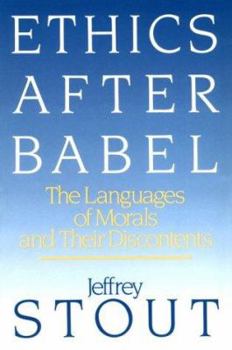Ethics After Babel Pa Txt
Select Format
Select Condition 
Book Overview
A fascinating study of moral languages and their discontents, Ethics after Babel explains the links that connect contemporary moral philosophy, religious ethics, and political thought in clear,... This description may be from another edition of this product.
Format:Paperback
Language:English
ISBN:0807014036
ISBN13:9780807014035
Release Date:January 1988
Publisher:Beacon Press (MA)
Length:150 Pages
Weight:1.05 lbs.
Dimensions:1.0" x 6.0" x 9.0"
Customer Reviews
2 ratings
ethics in the real world
Published by Thriftbooks.com User , 21 years ago
Stout's book is a good discussion of how to choose the best among many choices in an increasingly relativistic world. I have used it to teach undergraduates comparative ethics and most of them found it useful and interesting, though not an easy read. It would be best suited to an upper level undergrad class and/or the lay reader who might have some background in ethical theory.By far the most important idea in the book (to my mind) is that of the ethical bricolleur - the person who uses all at his/her disposal to develop a cogent ethic for his/her life in the context of their communities.If you are looking for simple answers in ethics, this is not your text, but if you want a coherent, well reasoned discussion of the moral 'grey areas' we all need to traverse, Stout is a good choice.
Helpful book covers the interesting in contemp ethics
Published by Thriftbooks.com User , 26 years ago
The best part of this book is in the last few chapters or so when Stout comments on the work of Alasdair MacIntyre and Richard Rorty. Stout paints himself as a "sensible" Rortian but adopts the conceptual framework of chapters 13 & 14 of MacIntyre's _After Virtue_. This is a very interesting amalgamation indeed and well-worthy of its characterization as "bricolage." One of the most interesting things Stout does with MacIntyre is to apply M's virtue ethic concepts (tradition, practice internal goods, etc.) to medical ethics. Since virtue ethics is unquestionably one of the most promising strands of contemporary moral philosophy, and because applied ethics have been dominated by Consequentialists and Kantians to this point, Stout's suggestions here cannot be but intriguing. The opening chapter where Stout categorizes types of relativism and explains his own position is also helpful. The chapters on moral abomination and James Gustafson do not cohere well with the rest of the book. The stuff about why we view things as abominable is good food for thought but doesn't seem truly apropos. In the Gustafson chapter, Stout appears to correctly identify Gustafson's views as theism with the theism taken away. But if this is true, why would this material prove interesting to the theist or the atheist? The ideas in this chapter certainly did not prove interesting to me. It would be well-skipped. But all in all, this book is worth reading, if selectively.






